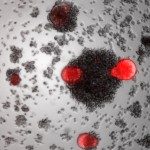Lien vers Pubmed [PMID] – 19695382
Adv. Virus Res. 2009;73:99-170
Regulation of protein synthesis by viruses occurs at all levels of translation. Even prior to protein synthesis itself, the accessibility of the various open reading frames contained in the viral genome is precisely controlled. Eukaryotic viruses resort to a vast array of strategies to divert the translation machinery in their favor, in particular, at initiation of translation. These strategies are not only designed to circumvent strategies common to cell protein synthesis in eukaryotes, but as revealed more recently, they also aim at modifying or damaging cell factors, the virus having the capacity to multiply in the absence of these factors. In addition to unraveling mechanisms that may constitute new targets in view of controlling virus diseases, viruses constitute incomparably useful tools to gain in-depth knowledge on a multitude of cell pathways.

